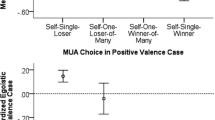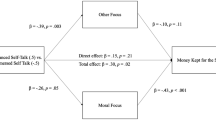Abstract
The present study examined whether manipulating the closeness of reference points can provide further insights into explaining why people care so much about receiving voice (i.e., the opportunity to express one’s opinion with respect to allocation decisions). Participants read a scenario portraying a situation where they had always been a member of the relevant team (i.e., distant referent point condition) or where they had just become a member of the relevant team (i.e., close referent point condition). Thereafter, they were either told that they would receive voice or no voice with respect to the issue of distributing a financial bonus. The results showed that people cared more about voice when they were placed in the distant referent condition rather than in the close referent condition. This effect was strongest on participants’ positive emotions (i.e., being positive when receiving voice vs. receiving no voice) than on their negative emotions. The findings are discussed in light of procedural fairness, counterfactual thinking, and emotion literature.
Similar content being viewed by others
References
Baumeister, R.F., & Leafy, M.R. (1995). The need to belong: Desire for interpersonal attachments as a fundamental human motivation. Psychological Bulletin, 117, 497–529.
Brockner, J., Heuer, L., Siegel, P.A., Wiesenfeld, B., Martin, C., Grover, S., Reed, T., & Bjorgvinsson, S. (1998). The moderating effect of self-esteem in reaction to voice: Converging evidence from five studies. Journal of Personality and Social Psychology, 75, 394–407.
Brockner, J., & Wiesenfeld, B.M. (1996). An integrative framework for explaining reactions to decisions: Interactive effects of outcomes and procedures. Psychological Bulletin, 120, 189–208.
Cropanzano, R., & Folger, R. (1989). Referent cognitions and task decision autonomy: Beyond equity theory. Journal of Applied Psychology, 74, 293–299.
Cropanzano, R., & Randall, M.L. (1995). Advance notions as a means of reducing relative deprivation. Social Justice Research, 8, 217–238.
Davis, C.G., Lehman, D.R., Wortman, C.B., Silver, R.C., & Thompson, S.C. (1995). The undoing of traumatic life events. Personality and Social Psychology Bulletin, 21, 109–124.
Folger, R. (1977). Distributive and procedural justice: Combined impact of “voice” and improvement of experienced inequity. Journal of Personality and Social Psychology, 35, 108–119.
Folger, R. (1986). Rethinking equity theory: A referent cognitions model. In M. Bierhoff, R.L. Cohen, & J. Greenberg (Eds.), Justice in social relations (pp. 145–162). New York: Plenum.
Gilovich, T., & Medvec, V.H. (1994). The temporal pattern to the experience of regret. Journal of Personality and Social Psychology, 67, 357–365.
Greenberg, J. (1987). Using diaries to promote procedural justice in performance appraisals. Social Justice Research, 1, 219–234.
Higgins, E.T., Friedman, R.S., Hadow, R.E., Idson, L.C., Ayduk, O.N., & Taylor, A. (2001). Achievement orientation from subjective histories of success: Promotion pride versus prevention. European Journal of Social Psychology, 31, 3–24.
Kahneman, D., & Miller, D.T. (1986). Norm theory: Comparing reality to its alternatives, Psychological Review, 93, 136–153.
Kahneman, D., & Tversky, A. 1982). The simulation heuristic. In D. Kahneman, P. Slovic, & A. Tversky (Eds.), Judgment under uncertainty: Heuristics and biases (pp. 201–208). New York: Cambridge University Press.
Koper, G., van Knippenberg, D., Bouhuijs, F., Vermunt, R., & Wilke, H.A.M. (1993). Procedural fairness and self-esteem. European Journal of Social Psychology, 38, 504–516.
Landman, J. (1993). Regret: Persistence of the possible. New York: Oxford University Press.
Lind, E.A., Kanfer, R., & Earley, P.C. (1990). Voice, control, and procedural justice: Instrumental and noninstrumental concerns in fairness judgments, Journal of Personality and Social Psychology, 59, 952–959.
Lind, E.A., & Tyler, T.R. (1988). The social psychology of procedural justice. New York: Plenum Press.
Markman, K.D., Gavanski, I., Sherman, S.J., & McMullen, M.N. (1993). The mental simulation of better and worse possible words. Journal of Experimental Social Psychology, 29, 87–109.
McFarlin, D.B., & Sweeney, P.D. (1996). Does having a say matter only if you get your way? Instrumental and value expressive effects of employee voice. Basic and Applied Social Psychology, 18, 289–303.
McMullen, M. (1997). Affective contrast and assimilation in counterfactual thinking. Journal of Experimental Social Psychology, 33, 77–100.
Moorman, R.H. (199l). Relationship between organizational justice and organizational citizenship behaviors: Do fairness perceptions influence employee citizenship? Journal of Applied Psychology, 76, 845–855.
Nasco, S.A., & Marsh, K.L. (1999). Gaining control through counterfactual thinking. Personality, and Social Psychology Bulletin, 25, 556–568.
Roese, N.J. (1994). The functional basis of counteffactual thinking. Journal of Personality and Social Psychology, 66, 805–818.
Roese, N.J. (1997). Counterfactual thinking. Psychological Bulletin, 121, 133–148.
Sanna, L.J., Turley-Ames, K.J., & Meier, S. (1999). Mood, self-esteem, and simulated alternatives: Thought-provoking affective influences on counterfactual direction. Journal of Personality and Social Psychology, 76, 543–558.
Thibaut, J.W., & Walker, L. (1975). Procedural justice: A psychological analysis. Hillsdale, NJ: Erlbaum.
Tyler, T.R. (1989). The psychology of procedural justice: A test of the group value model. Journal of Personality and Social Psychology, 57, 333–344.
Tyler, T.R. (1990). Why people obey the law: Procedural justice, legitimacy, and compliance. New Haven, CT: Yale University Press.
Tyler, T.R., & Lind, E.A. (1992). A relational model of authority in groups. In M. Zanna (Ed.), Advances in Experimental Social Psychology (Vol. 25, pp. 115–191). New York: Academic Press.
Van den Bos, K. (1999). What are we talking about when we talk about no-voice procedures? On the psychology of the fair outcome effect. Journal of Experimental Social Psychology, 35, 560–577.
Van den Bos, K., Lind, E. A., Vermunt, R., & Wilke, H.A.M. (1997). How do I judge my outcome when I do not know the outcome of others? The psychology of the fair process effect. Journal of Personality and Social Psychology, 72, 1034–1046.
Van den Bos, K., & Miedema, J. (2000). Toward understanding why fairness matters: The influence of mortality salience on reactions to procedural fairness. Journal of Personality and Social Psychology, 79, 355–366.
Van den Bos, K., & van Prooijen, J.-W. (2001). Referent cognitions theory: The role of closeness of reference points in the psychology of voice. Journal of Personality and Social Psychology, 81, 616–4526.
Van den Bos, K., Vermunt, R., & Wilke, H.A.M. (1996). The consistency rule and the voice effect: The influence of expectations on procedural fairness judgements and performance. European Journal of Social Psychology, 26, 411–428.
Van den Bos, K., Wilke, H.A.M., & Lind, E.A. (1998). When do we need procedural fairness? The role of trust in authority. Journal of Personality and Social Psychology, 75, 1449–1458.
Zeelenberg, M., van Dijk, W.W., & Manstaed, A.S.R. (1998). Reconsidering the relation between regret and responsibility. Organizational Behavior and Human Decision Processes, 74, 254–272.
Author information
Authors and Affiliations
Rights and permissions
About this article
Cite this article
De Cremer, D., Stouten, J. When does giving voice or not matter? Procedural fairness effects as a function of closeness of reference points. Curr Psychol 24, 203–213 (2005). https://doi.org/10.1007/s12144-005-1022-9
Issue Date:
DOI: https://doi.org/10.1007/s12144-005-1022-9




